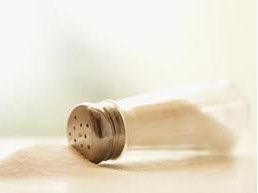-
(单词翻译:双击或拖选)
Salt vs. Ice
食盐大战冰块
Y: Why does salt melt ice?
D: It lowers the melting and freezing point of water.
Y: Oh,OK.Wait,I don't get it. Doesn't that mean the salt make ice colder?
D: Let me explain.Pure water freezes at thirty-two degrees Fahrenheit,right? At that temperature we can say that the rate of freezing is the same as the rate of melting.
Y: So in other words, at water’s freezing point there’s a sort of equilibrium1 between freezing and melting.
D: Right.Throwing salt on ice upsets the balance.
Y: Upsets it how?
D: The salt dissolves into the liquid water, which means that some of the water molecules2 are replaced by salt. Since there are now fewer liquid water molecules to be captured and frozen3 by the ice, the rate of freezing drops.
Y: I think I get it.And Since the rate of melting stays the same, there’s more melting going on than freezing. And so the ice melts.
D:Right.
Y: Interesting.
D: In fact, anything that dissolves in water will do the trick. You could pour sugar on ice and it will melt. But I guess since salt is cheaper it’s used more often.
Y:为什么食盐能让冰块融化?
D:是因为食盐将水的熔点和冰点降低了。
Y:等一下,我不明白。这就意味着食盐让冰的温度变得更低吗?
D:我解释一下。纯净水的冰点是32华氏度,对吧?这个温度既是冰点也是熔点。
Y:也就是说,水的冰点就是结冰和融化的平衡。
D:是的。在冰上洒盐扰乱了这种平衡。
Y:怎么打乱的呢?
D:盐溶解在水中,就是说一部分水分子被盐取代了。既然结冰的液态水分子减少了,冰点自然降低了。
Y:我明白了。水的熔点不变,融化的水分子比结冰的多,所以冰块就融化了。
D:对。
Y:很有趣。
D:其实,任何溶于水的物质都可以使冰融化。把糖洒在冰上,冰也会融化。但是我想也许由于盐比较便宜,所以经常被使用。
 收听单词发音
收听单词发音
1
equilibrium

|
|
| n.平衡,均衡,相称,均势,平静 | |
参考例句: |
|
|
|
2
molecules

|
|
| 分子( molecule的名词复数 ) | |
参考例句: |
|
|
|
3
frozen

|
|
| adj.冻结的,冰冻的 | |
参考例句: |
|
|
|


















